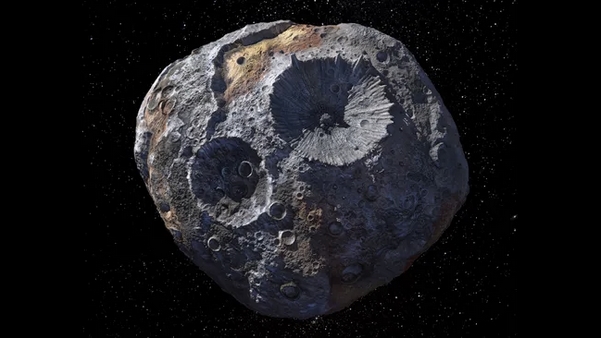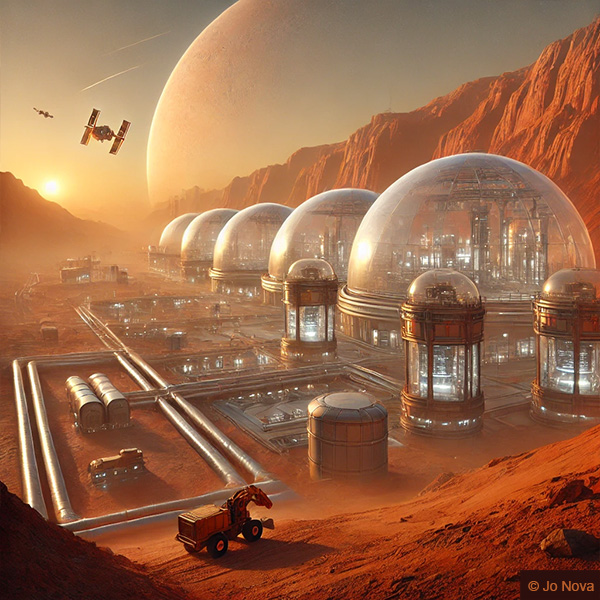By Jo Nova
Thanks to Elon, many people are wondering “Why Mars?” and the answer might be “mining the asteroids”
Devon Eriksen has the best answer I’ve seen. He compares the race to space with the industrial revolution. Just as wood, coal and oil set us free of lives of manual labor, a whole new set of materials beckon… if minerals that are rare and expensive on Earth can be mined in the asteroid belt, and processed on Mars, all kinds of new tools and toys may follow the boom.
The Earth, Eriksen says, is like a jar that’s been shaken until most of the heavy stuff settles to the bottom. The heavy metals mostly end up in the Earths core, with the lighter stuff on top. But apart from the distance, asteroids have easy access goods, and are split already into handy size chunks, conveniently parked out in the open, far from gravity wells and not hidden under crustal plates, oceans and magma. The rocks under our feet are so much closer but there is a whole planet in the way. It might be a lot cheaper to get the rare metals we need on asteroids than out of our core.
The 16-Psyche asteroid is one of the bigger ones, at 279 km across, or 173 miles, and spectroscopic analysis and radar indicates it’s mostly metal. Judging by other bits of meteorites that fall on Earth, speculation is rife that Psyche contains nickel, iron, and things like palladium and platinum, but of course, no one knows.
Humanity has collected so far all of 255 grams of asteroid space rock (5g from a Japanese launch and 250g from NASA). But China plans to launch Tianwen-2 next year and collect samples from the near-Earth asteroid Kamoʻoalewa.

16-Psyche asteroid, theoretically (possibly) a mine worth $100 Quadrillion dollars (Image: NASA/JPL-Caltech/ASU)
The race is on:
The Trillionaires of Mars
By Devon Eriksen, Substack
The first entity to establish a Mars colony will be the universe’s first trillionaire
Earth is a metal-poor, heavy-element-poor environment.
We just don’t think of it that way because it’s what we are used to. And it’s a major bottleneck holding our industrial development back. Not because these elements will run out, but because the expense of extracting them limits availability, and drives costs up.
Well, the mass of the asteroid belt is roughly 0.05% of Earth’s mass. But, unlike the Earth, the asteroid belt isn’t a big lump of material, sitting in its own steep gravity well. It’s a powder. A spray of fine dust orbiting the sun. The largest asteroid is only about the size of Texas, and most are much smaller.
One single asteroid, 16 Psyche, some 140 miles across*, has an estimated value at today’s market prices of 100 quadrillion dollars. You read that right. That’s roughly 900 times the value of the entire world economy.
On Earth we live at the bottom of a deep gravity well, and all the hard part of a journey to the asteroids is just getting out of the driveway accelerating at 10 meters per second per second. But Mars has a much smaller gravity well, and suddenly so much more interaction with space is possible:
… Mars’s gravity acceleration is about a third of Earth’s. A little over 3.5 m/s². Rocket science is not so difficult on Mars. [Closed caption for the hard-of-thinking: Devon is speaking comparatively. Rocket engineering is still difficult.]
So if you think SpaceX can move stuff to Earth orbit cheaply now, with their fancy reusable rocket boosters, and all their lightyears-ahead-of-NASA space tech, and their $2 million dollar Starship launches, you ain’t seen nothing yet.
On Mars, with its ⅓ gravity, and thin atmosphere, you wouldn’t even need a rocket to achieve escape velocity.
It’s the fact that here you have a planet, where people can live in sealed habitats (above or below the surface), and it’s really, really easy to throw things into space, and get them to and from the asteroid belt.
In other words, if Earth is the suburbs, and the Belt is the mine, Mars is your industrial zone.
Hell, you don’t even need to mine asteroids in place.
Depending on the delta-v cost, you can just attach boosters to your smaller rocks and push them right into Mars orbit. It’s called a Hohmann transfer. But whether you are moving metal from a mobile refinery, raw ore, or entire rocks, cargo is cheap to move in space, at least compared to space launch from Earth’s surface.
Space isn’t an ocean, you see. There are no waves, your cargo can’t sink, and there’s no air to slow it down. So you don’t load it up into a ship, and sail the ship somewhere.
There’s no place like space for those self-driving vehicles.
The man who builds Tesla cars,
May set up a workshop on Mars,
With rich ores to smelt,
From the asteroid belt,
Which could pave our way to the stars.
–Ruairi
h/t to David E
*It’s the average diameter, which is why it’s different to the NASA figure which is the longest width.













I had about thirty second of skepticism — then I recalled 65 years of reading science fiction, and how many of the
fanciful, but not-in-violation-of-physics predictions have come true. In & around my college years, the first satellite
went up that allowed for a TV signal to bounce live from space for a few minutes. Now…..
We have satellite radio in our cars, starlink in our pockets, and gps is ubiquitous.
A settlement on mars is probably now just a set of engineering problems, and the cost is probably also manageable and predictable.
A pound of gold is worth about $32,000. Pounds of exotics have higher values. Delivery back to earth can use gravity for most propulsion and
a Rutan feather type vehicle to land on normal runways;
Regrettably, throwing rocks from space also becomes the top of the food chain weapons system; look for governments to be terrified as private development
proceeds and throw up all the roadblocks possible. A super-villian in space might indeed be able to blackmail the world. More life imitating art.
340
Gravity will not provide most of the propulsion to bring the metals back to Earth, not without complex slingshots around heavier masses.
An object orbiting the sun has a specific potential energy, due to the distance that it has to fall to the sun, same for the Earth. The object further out has higher energy.
To get the object closer in you have to lose that energy. The most direct way would be to place a rocket on it and slow the orbital velocity, if you time the burns and point the nozzle in the right direction, then you could bring the object to Earth.
It’s going to take a large rocket to bring the object here. It’s the same energy requirement to move a mass to an outer orbits as to bring it back, it’s just that the force will be in the opposite direction, eg a deceleration burn.
190
As evidenced just in the last few days as Earth’s mini moon departs. (well it came and went in 57 days anyway)
Sorta wonder why we didn’t grab hold of it when we had the chance. Must be cheaper to go to Mars and do it, eh!
Tony.
80
I’d reckon!
10
The concept for low energy orbital transfer is known as the Hohmann transfer orbit.
Walter Hohmann devised and published it in 1925, having got the idea from an 1897 work of science fiction called Two Planets about intelligent life on … Mars.
40
Slingshot…. See first line.
And of course, you still have to escape Earth’s local gravity well to be able to use a slingshot and similar, if leaving Mars.
10
Concerning throwing rocks to Earth, have you read “The Monn is a Harsh Mistress” by Robert Heinlein?
10
Basic question.
Do we have the technology to keep humans alive for long term in non-Earth (outside the Magnetosphere) interplanetary space?
AFAIK the Apollo missions ventured there for only short periods nearly a half century ago.
Nothing since.
I did notice SpaceX’s magnificent technological feat of rescuing the stranded ISS astronauts complete with a capsule splashdown …
just like 1962.
Sorry, a Mars colony is in my same brain file as my George Jetson flying car and my Moon vacation.
I shall wait patiently to be corrected with hopefully only the amount of derision appropriate to my NPC midwittery.
230
Correct Honk. One thing Earth’s explorers did not have to worry about was where their oxygen was coming from. No amount of technology will solve that problem in space. It will only take one accident, a la Apollo 13 for it all to fall to pieces.
131
And NASA was lucky that a solar flare didn’t go off. The less time above a protective atmosphere or under a large shield the better. Some of the atomic particles raining down on the top of the Earth’s atmosphere pack enough energy to be compared to a baseball at 100km/hr. I’d hate to have a little of my DNA hit by that.
It takes kilometers of atmosphere to remove most of the cosmic rays, a few mm of aluminium sheeting will actually make it worse because of the particles that are created as the cosmic ray hits the aluminium and then they stream into your body.
70
Robotics is the answer, humans need not even go there if we develop hubots to take our place.
111
Robots certainly are the short-term answer and could be used for mining operations, but Musk’s whole reason for going to Mars is as a first-step towards making humanity an interstellar species that isn’t dependent on a single planet for it’s survival. With that as the goal, humans eventually have to venture out into space, first within this solar system and eventually without.
30
Bots?
10
All sorts.
https://www.scmp.com/news/china/science/article/3288131/robot-jumps-and-lands-cat-it-could-be-used-explore-asteroids?module=top_story&pgtype=homepage
11
Evidence seems to suggest that evolution occurs very quickly when exposed to different gravity, radiation and atmospheric conditions. Send up humans and it might not be long before it’s a different life form than originally left the earth.
50
Is rapid death in space and time an evolutionary process?
20
Yes!
10
Sort of goes in reverse doesn’t it?
We don’t inhabit the landscape, we are the landscape.
Do the creatures change nature or does nature change the creatures?
The concepts of anthropogenic climate influence and human exo-planet existence may have a similar logic problem.
20
Here’s your flying car: https://global.honda/en/tech/Electric_Vertical_Take-Off_and_Landing_aircraft_eVTOL/
10
Darth Vader has already beaten Elon in the race to Mars, according to your first picture 😉
70
I would imagine there might be a slight issue getting the completed heavy product in quantities from Mars back to earth.
50
Back to Earth?? Easier to move the humans to where the resources are and live there.
Would we really move metal back to Earth, have factories in orbit making TVs with it and then shipping them down for people to watch? I suppose the peasants get shipped off to the asteroid belt to mine and move material, and they’re the ones in permanent orbit making the products needed for the handful of trillionaires who live on Earth with their servants in vast natural estates..
“65 years of reading science fiction”.. yes, its thrown up a wide range of scenarios for just what we are seeing get started!
40
A space elevator between Mars and Phobus might hold the answer, the moon is locked in place and not far from the Martian surface.
42
So el gordo, the trilogy “Red Mars”, “Green Mars” and “Blue Mars”, written in the early 2000’s by Kim Stanley Robinson finally becomes reality….
00
Never stop dreaming, striving achieving. Progress is dependent upon materials and energy science and someday someone will likely stumble upon something which will eventually free mankind from a future resource deprived doomed planet.
or invent soylent green
60
I will take a post nuclear war ravaged, resources depleted planet that has a tolerable temperature and breathable atmosphere,….over Mars ,…….Every time !
130
All of this was covered in the late Dr Jerry Pournelle’s 1980’s book “A Step Further Out” which, though very dated now, I highly commend as a primer on the subject at hand.
70
First big problem is the length of time to and from Mars and eating out of tubes doesn’t seem to be very attractive for months or years between trips.
And what is the tonnage of the goodies you send back to Earth to be made into stuff for the buyers?
The whole operation doesn’t make much sense when the extremes of time are taken into account.
How many millions of $ do you pay the astronauts for each trip and many years of work?
You may also have severe health problems on Mars and perhaps a much lower life expectancy after you return.
I think boredom would be another problem and watching Netflix etc wouldn’t provide much relief.
70
Martian Uyghurs or humans with hay fever.
I suppose it depends on which nation gets there first.
40
I think it’s wonderful as long as the Left don’t turn it into some subsidy-harvesting scam funded by hard-working taxpayers. The Left mess up everything they touch.
Let free market forces operate and see what happens.
Personally, I wouldn’t want to live on Mars. It’s a cold, miserable, low gravity environment. Odd also that it’s so cold with an almost 100% CO2 atmosphere. Doesn’t Leftist “science” tell us it should be like a furnace? (Partial pressure CO2 on Earth 31.8Pa, Mars approx. 700Pa, solar insolation Earth 1350 W/m2, Mars 590 W/m2.)
Terraforming is a long term option but the Left are already trying to alter the climate on earth and spending trillions without success so why mess up another planet?
160
I think it would be cheaper to mine the oceans.
Maybe there will be money in the cleaning of all the filters from the desal plants? If only the manufacturers could get the filters to trap and hold onto a mineral of choice eg gold. Now that would be a win. The desal plants already exist, so do the filters and the energy to run them apparently. We just need that little tweak of the membranes.
Could be worth a grant or two. Where do I apply?
130
Might be cheaper, but not worthwhile. I remember the comic magazine covers of my childhood(*) saying something like 3 tons of gold per cubic mile of ocean. Back of the envelope calculation:
A mile is 1600m. Cubing that gets 4096 million m^3, i.e. 4096 gigalitres.
Sydney’s desal plant says it can produce “up to” 91.25 gigalitres per annum.
That means it’d take *45* years to extract 3 tons of gold. By contrast, the *annual* gold production of that gold-megaplayer New Zealand is 6.1 tonnes.
(*)A quick scan of the web for gold per cubic mile of ocean gave me figures between 25T and 50 lbs. I’ll go with the figure from the comics.
70
Extracting dissolved gold from seawater has been tried a number of times and is still being tried.
It was most famously tried by Fritz Haber to help pay off Germany’s war reparations from WW1 but needed vast amounts of electricity and wasn’t worthwhile.
Today there is a start up company called Retreeva that aims to use some sort of molecular “sponge” technology to retrieve trace gold from gold-mining processing waste streams. See https://actu.epfl.ch/news/retreeva-a-startup-that-retrieves-lost-gold-and-cu/ However, I am sceptical because an immediate alarm bell that rings for me is that in the linked article they mention cutting “carbon emissions” (sic) SIX times. There must be a subsidy there just waiting to be harvested.
I think it’s impractical and uneconomical and is probably as futile as trying to run an industrial civilisation on windmills and solar panels.
70
Eng_Ian, it would be far more profitable to own Victoria’s desal plant than extract gold from it, as it remains idle.
Even as an unused asset it earns money.
Those figures are as of six years ago. They could easily be $2 million per day now for this unused idle asset. And all because Flim Flammery convinced simpletons in various Australian Governments that it was never going to rain again, after which they also stopped building dams and pipelines.
60
But what about the grant….?
Can I still get a grant to do the study?
50
Venus has roughly the same amount of CO2 but under immense pressure it becomes a furnace. Humans could holiday top of atmosphere, the air is better there.
11
Venus is hot due to adiabatic compression of the atmosphere, not because it’s CO2.
And it would be great holidaying on a balloon in the upper atmosphere, as long as there was an appropriate rocket safety system to escape to orbit in the event of a balloon failure.
20
‘Venus is hot due to adiabatic compression …’
Thanks for that information, when someone mentions a runaway greenhouse effect on Venus I can set them straight.
11
Until somebody convinces me otherwise, I’ll stick to the idea that it’s proximity of the sun that makes Venus hotter.
20
>under immense pressure…
And 129 million kilometres closer to the sun.
40
Being closer to the sun makes a difference.
‘At elevation 51 km the Venusian atmospheric pressure is the same as one Earth atmosphere. The temperature at 51 km is 65 deg C which is 17% warmer than Earth’s surface average of 15 deg C. (Kelvin scale).
‘Increasing the Earth atmospheric pressure 95 times delivers a temperature 50 degrees cooler than the surface temperature of Venus. Equally moving the Earth to Venus’s orbit increases the surface temperature by 50 deg C.
‘Basically this shows that the CO2 contributions to planetary temperatures is negligible. Temperature/pressure wise both planets follow identical curves yet one is 9700 parts CO2 in 10,000 and the other is 4 parts CO2 in 10,000.’ (Julian Fell)
41
Onwards and Upwards and to Infinity and Beyond. I’ll be long gone by then.
60
Something like:
“Well may the meek inherit the earth,but the bolt will take the stars.”
I vaguely recall that bit of hopeful thinking is from a science fiction novel, but it could just as easily be credited to several astrophysicists.
Then again, if, as the ABCess et al are declaring, the jig is up in three years, humanity can die with a whimper or actually try something serious.
Once again: “The eco-nazis are a DEATH CULT”.
70
“Space isn’t an ocean… There are no waves, your cargo can’t sink”
And then along came a solar tsunami…
https://solartsunamis.otago.ac.nz
Spacequakes the size of our solar system? How does the advice of ‘run to higher ground’ work when you’re floating in a tin can, far above the moon… or Mars.
80
Its more than likely Helium-3 will be mined first.
https://www.esa.int/Enabling_Support/Preparing_for_the_Future/Space_for_Earth/Energy/Helium-3_mining_on_the_lunar_surface
51
Essential for regular cargo flights between Earth and Mars is Elon Musk, SpaceX, Starship, and in particular the re-invented rocket engine, the Raptor.
Here is a video about the Raptor rocket engine.
https://youtu.be/nP9OaYUjvdE
40
See a picture of three generations of Raptor engine here.
The simplicity of the Raptor 3 is magnificent.
https://x.com/SpaceX/status/1819772716339339664
20
Imagine if they ever got metric.
30
“BOLD”!!…….
20
I’ve heard there’s people in Zimbabwe who are already trillionaires … so too late if you wanted to be first on that one.
There’s still opportunities to be first on Mars though.
40
One hundred trillionaires.
You just need one of these:
https://www.alamy.com/stock-photo-zimbabwean-one-hundred-trillion-dollars-banknote-27102202.html
Perhaps Jim Chalmers will soon be doing the same with Australians. We are getting there with a real inflation rate of about 30% (not the official rate of 3.8%).
60
Postage is already expensive enough.
20
Hey wait a minute!
I opened that top image on a new page, enlarged it, and looked through a magnifying glass.
I swear those b@$t@rds in that large dome in the foreground are making d@mned solar panels!
Tony.
100
Naturally – Mars being further from the sun such panels would get higher subsidies.
70
I regret having but one thumb to give to this jo… I mean astute political observation.
20
We speak in terms of money – but it’s really about energy. The amount of energy needed to get out of earths gravitational field. The amount of energy needed to slow a mass down so it falls toward the sun(earth). The amount energy needed to support life on Mars (autonomous AI might be cheaper). Really our economy is ‘energy’ – from the first wood fire, to nuclear power plants. Stifle our energy production – stifle our growth and advancement.
70
Lots of engineering issues and biological issues to solve first . We are adapted to living in a gravity well and don’t do well without it . Basic physics means that reaction mass has to be incorporated in any spacecraft and moving mass requires energy . The energy budget for asteroid mining has to make sense – its got to be better than mining at home . The other issue is time required to transit interplanetary space and the longevity of complex systems in that environment . We will IMHO require a breakthrough in science to make it work . Someone has to find a way to manipulate spacetime or gravity and we are off…
40
‘Joe Rogan in shock as whistleblower reveals US military has mastered ‘alien anti-gravity’ technology.’ (Daily Mail)
21
Please provide the podcast/video/evidence.
20
Its top secret.
11
On Earth they do some mining with blasting. Out there, I assume the blasted material will keep traveling rather than settling back to the surface. Scoop it up with flying loaders?
30
Depends on Environment Minister Tanya Plibersek’s controversial Nature Positive plan and the idiot Greens.
70
And native title claims
40
We often have poor intuition about the pace of progress. It is likely that (and certainly possible) that one of the first two men to achieve powered flight, and one of the first men on the moon were in the same room at the same time. The airplane and the automobile entered our world in the first decade of the 20th century, after a couple of millenia of work finally provided the necessary environment. Both had been often imagined before being built. The 20th century laid the groundwork for our innovations today. Looking at the timeline mars doesn’t seem impossible in 50 years.
50
Possible. Orville Wright died Jan. 1948 whereas both Neil Armstrong & Buzz Aldrin were born in 1930.
30
Instead of sending Bowen and the rest of the motley crew to Cop 50 send them to Mars. Now that should concentrate their minds enough to rid them of their fantasies.
80
I think that Bowen And Albonese will both be history before COP30.
Possibly the ABC would remember them, but most of the public will think of then as a passing headache.
70
I feel a bad case of diarrhea is more appropriate.
70
Rather you than me.
30
With Albo, Bowen, Wong, Burke and commpany running the show, I have zero need for laxatives!
10
On the “B” Ark?
40
The man who builds Tesla cars,
May set up a workshop on Mars,
With rich ores to smelt,
From the asteroid belt,
Which could pave our way to the stars.
130
There’s a good old western called McKenna’s Gold, about a huge valley of gold, but in dangerous Indian land of course.
In the end he escapes with a few saddlebags of gold, and says “maybe in a planet made of gold, men will kill each other for a handful of dirt”. Classic brilliant line.
There are a few lessons there, and smart readers have already spotted them.
More perceptive readers will have instantly realised how all that “astro gold” will collapse its value.
We can’t have that now can we! 😁
Elderfox documentaries on youtube do live Mars 4k footage video, and you can see it’s just barren rock and sand.
You’ll have to take an equivalent small town from here to there. Oh, the environmentally UNfriendly things we’ll do to achieve that end would cause grumpy Greta’s head to explode.
Plus there’s already a LONG list of people happy (in their ignorance (think 1 minute city as that’s how restrictive it’ll be)) to move to Mars to escape life on Earth.
Nope, it’s pure fantasy for the forseeable future, and after all, we have to fight Russia and deliberately destroy Ukraine in the process to plunder their vast natural resources here on Earth first and that’s not doing too well…
60
I can just see it now. There is mining on an asteroid in the Asteroid Belt and a large mining explosion causes this particular asteroid to spin out of orbit and drift out with gravity pull towards the Sun. The Earth in it’s orbit around the Sun gets in the way and wallop. Bang. The asteroid hits Planet Earth.
All the dinosaurs die (Left Wingers, Woke People, Diversity Managers, Marxists, Politicians, etc, etc.).
And everybody else lived happily ever after.
50
I left out alleged Climate Scientists……….lol
40
They died as well.
30
Like this?
https://m.youtube.com/watch?v=AhTadcV0myo&t=56s&pp=2AE4kAIB
The demolitions for the colony screwed up the orbit…
30
Actually, this all reminds me of Red Dwarf –
https://www.youtube.com/watch?v=zV0hwZwNQZc
30
JR,
Classic politically incorrect humor . Hitchhikers guide also…
40
A Johnny Rotten is always politically incorrect whenever is allowed to be.
Albo Sleazy and all the other Marxists. Please note.
20
Devon Erikson has a cracker of an SF novel ” Theft of Fire”. First in a series. Can’t wait for the second.
10
Seems like an episode of the alternate reality/timeline Sci-Fi Series on Apple+ TV, “For All Mankind”. Great show, where Russia beat America to the moon, and flow on effects from that!
In season 4 they just captured an asteroid and put it in Mars orbit to start mining it. Full of a rare earth mineral, Iridium, worth trillions.
10
The real value of Musk’s rocket dreams is in his network of 6246 satellites, an amazing number. I think the mission to Mars is a boys own dream which is within reach. But if the dream is mineral wealth, I fear the costs are prohibitive.
I also believe we have not explored planet earth. In 1972 oil war running out. And oil was a 1900 replacement for coal. It was only in 1912 that Winston Churchill ordered the British Fleet to change from coal to oil. 90% of our trade still is on ships and they run on fuel oil, lots of fuel oil. So ultimately do Musk’s rocket ships. Mars is not promising new energy.
Since 1972 we have found oil across the world. Now that sulphur is removable, banned Venezuelan oil is usable and they have more than Saudi Arabia. During Donald Trump’s last term, America was the world’s largest producer of oil!
But the real dream is fusion. And for the $1.8Tn a year spent on stopping CO2 from climbing steadily, a total failure, we may have had fusion already.
And then I believe we have only scratched the surface of the planet. And not very well. All of Siberia? No one lives there, for good reason.
$1.8Tn a year on building Thorium reactors would end energy needs and Australia has 50% of the world’s Thorium. And Thorium is 100% usable for power, unlike the 0.72% of Uranium which is U235. We in Australia would be an energy Superpower in truth, not Albanese’s silly stories. Andrew Forrest is looking very silly with his green hydrogen and our other billionaires with a single very vulnerable sea cable. We are ignoring the obvious because of Green absurdities about the danger of the sixth element of the periodic table, the one from which we are all made.
Frankly, Elon is just having fun. And going to Mars is not much more expensive than what he has done. Men have landed on the moon with nothing more powerful than a pocket calculator and duct tape to fix the leaks. But his robots will do a better job, without oxygen and toilet and food and water needs and with AI and vision. Even Voyager is still signalling from way past the solar system with its nuclear battery. Elon’s robots will be more significant than any mission to Mars. It’s the stuff of Isaac Azimov.
So let’s find all the oil, gas, coal, gold, copper, platinum we can find and use the utterly wasted carbon ripoff cash to fund exploration of our own planet and research into fusion and Thorium. Let the robots party on the moon. It’s far too far to go even to Mars. Ask Voyager I from 1977 and Voyager II.
Light takes 9 minutes to get to us from the sun as 92 million miles. Voyager I is 22 1/2 hours away!
60
Devon Erikson’s retort to you is “Don’t be a puddlefish”
10
“If you are a puddlefish, if you think this is a wasteful showpiece or science project, then you don’t understand physics, economics, astronomy, or in fact the basic layout of the universe you live in.
We live in a tiny puddle at the bottom of a well.
Out there is an entire universe, full not only of stuff to explore, but full of stuff to build things out of.
Big things. Wonderful things. Things that are going to make all of the cool stuff you have today, all of human civilization to date look like early Assyrians writing stuff down on wet clay with a reed.
Infinite resources. Infinite energy. Infinite space. “
Great. Dreaming is fine. It’s what drives astronomers. And Elon Musk. But humans are incredibly fragile. And there is nowhere in our huge solar system we can live but our own little puddle. It’s a very deep well.
31
And as I see the extraordinarily crippling cost of anti carbon spending by latter day luddites and climatebaggers. I have to point out we could reach for the stars if we directed that money to making energy cheaper and more abundant and even limitless. Nuclear energy is the answer, as if that wasn’t obvious. If we had to abandon earth, despite our arrogance, we cannot and there is nowhere to go.
40
To a large extent, we already make our own living environments. What you have is a failure of imagination. A puddlefish.
10
” And there is nowhere in our huge solar system we can live but our own little puddle.”
All the elements are available across the solar system, so its not hard to make carbon chains, water and oxygen. Once you’re on Mars or in the asteroid belt, it may be different from trying to mine Siberia, but not necessarily harder. Why would you not live on Mars instead of your 15minute city on Earth? Its only the first generation of immigrants who miss ‘the old place’.
Talk to the 65years of reading science fiction and there are some great ideas put up.
30
TdeF,
We are exporting Thorium to India and China – its a residue of coal ash . Two for the price of one.
40
I know India is developing at least one Thorium reactor. Why aren’t we? Why is nuclear power illegal but China has it? India, Pakistan too. France, UK, Israel.
30
The Falkland islands are floating on oil. If only the British were less woke, the Empire could finally strike back with a vengeance.
20
Now for the first time I understand the Falklands war. From both sides. The Argentinians were about a distraction from the disaster in the economy by the ruling Junta. Thatcher as the last remnant of Britain in the South Atlantic, populated for all time by English people. England is itself a group of islands in the Atlantic. But perhaps it was all about the oil?
10
And my point before I am off topic, is that there is a lot of oil untapped. Energy, not minerals is our problem.
I am also sure the heavier minerals are there for the looking. I don’t know I accept this heaviest at the bottom logic.
While the heavier ones are in the molten core, there is still plenty of gold(79) and uranium(92) and thorium(90) on the surface, within 1km. And uranium is the heaviest naturally occurring element, so I’m not sure asteroids or Mars would have more of anything.
And there is plenty of Lithium(3) on the surface in Australia too. It is so light at 530 kg for a cubic meter that while most of a modern battery, it is only 10% of the weight. Steel hasa density of 8000kg cubic meter. Even lightweight aluminium is 2700kg/cubic meter. All these minerals are on the surface, though gold occurs in veins, thrown up from the depths. The planet has mainly a swirling molten iron core. The crust is more like a stew and what is on the surface varies. We only have to find what we want, which is the job of geologists.
But who is going to say it’s not worth going to Mars once or twice. It would be a long trip unless you could slingshot, but around what? It’s the next planet.
10
Wow, just wow. “An independent report into the North Falkland Basin has upgraded estimates of recoverable oil resources from 791m barrels to 917m – twice the annual output of the entire North Sea”. Maggie was definitely onto something and its wasn’t just basic British pride.
40
Is the recoverable 917 total or predicted annual output? If just recoverable total, it is equal to two years of the North Sea.
10
Just two years then. The North Sea has 24 Billion barrels left expected to last for 35 years. North Falkland has just under a billion barrels. Still, that’s a lot of oil.
10
I have always wondered why there is so little interest in Thorium when we have an abundance of it. Australia lost its enterprising spirit a long time ago. Or rather – it succumbed to a timid political class.
20
We have enough of a problem mining Uranium! Most is in South Australia and they are against capitalism, mining, defence, manufacture and nuclear power. It’s what happens when you have a culture based on public servants and pubs. At least they voted overwhelmingly against The Voice, which is why it is being legislated in SA right now, against the explicit wishes of the people in South Australia.
Which shows you why Elon Musk is changing things. The biggest problem is in governments who are only good at stopping things and wrecking the place and spending billions randomly, merely on a whim for a few mates. Unless you think $1Bn investment of our money in pure speculation Quantum Computing shares in the US will pay off? Who gave our PM the right to play the pokies with our money? Just as IBM is getting out. Can we sell the shares and get the money back? Or Turnbulls $444 Million. Where is it? What good did it do? No one answers.
Who said the PM can spend billions on his favorite ideas with no business plan? Like Snowy II? Or French Desalination plants?
No half baked power mad Prime Minister should behave as if he is really self made Elon Musk, spending his own money without limit or any public accountability!
30
WMBriggs on Quantum computing:
https://www.wmbriggs.com/post/54033/
21
It seems insane. I don’t follow it, despite my quantum mechanics. As for error correction, it seems an even bigger problem based on the first.
10
Fire up the ion engines of my transporter: I’m gonna have a few shots of liquid CO₂ in the Mars Bar.
10
What does it mean to say that an asteroid is the size of Texas? Does it have a surface area equivalent to that of Texas?
20
https://www.youtube.com/watch?v=JZBY-Hb-TDw Afronauts: Interview with Edward Nkoloso | Head of Zambia’s Unofficial Space Programme | Nov. 1964
10
I’m not into science fiction.
I have had a real close look at the gear they claim was used for that ‘moon landing’ way back when.
It was a good story, but not more than that.
That junk never went outer space.
It never left earth.
11
Do you think the ISS is real? Do you think SpaceX goes to orbit?
After that its only a simple step to the Moon. Forced induction, as in turbos and superchargers, multi-valve engines, twin cam heads were all used 50years before they became mainstream, yet ask people in the 1980s and they would say it was all new technology.
20
There is no comparison to the industrial revolution. The industrial revolution was created by the available of cheap energy in the form of coal. That cheap energy created a boom if economic growth that still continues till this day.
Going to Mars will not.
10
The most valuable space resources will be those used in space. Water ice, the black tarry stuff on comets, Martian CO2 and nitrogen etc. CHON i.e food and fuel amongst other things.
Those who think this can’t happen need to take a few mental steps further – what are the implications of the entire human race and civilisation stuck on Earth forever? It won’t be pretty and we may not last all that long so everything we’ve done and been and seen and loved will be forgotten and Mind will disappear from the Universe. See Oriana Fallaci’s letter to her father after meeting with Ray Bradbury. It is in her “If the Sun Dies”.
We are Gaia’s reproductive system. We alone can bring life to a dead Universe. It’s our sacred task.
The rest of you puddlefish can remain on Earth.
00